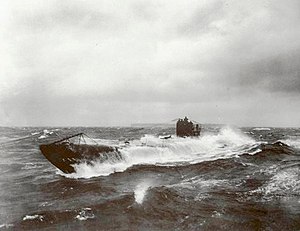SM UB-110
 UB-148 at sea, a U-boat similar to UB-110.
| |
| History | |
|---|---|
| Name | UB-110 |
| Ordered | 6/8 February 1917[1] |
| Builder | Blohm & Voss, Hamburg |
| Cost | 3,714,000 German Papiermark |
| Yard number | 316 |
| Launched | 1 September 1917[2] |
| Commissioned | 23 March 1918[2] |
| Fate | sunk by HMS Garry on 19 July 1918 at 54°39′N 0°55′W / 54.650°N 0.917°W[2] |
| General characteristics [2] | |
| Class and type | German Type UB III submarine |
| Displacement |
|
| Length | 55.30 m (181 ft 5 in) (o/a) |
| Beam | 5.80 m (19.0 ft) |
| Draught | 3.70 m (12 ft 2 in) |
| Propulsion |
|
| Speed |
|
| Range |
|
| Test depth | 50 m (160 ft) |
| Complement | 3 officers, (max.)31 men[2] |
| Armament |
|
| Service record | |
| Part of: |
|
| Commanders: |
|
| Operations: | 2 patrols |
| Victories: | |
SM UB-110 was a German Type UB III submarine or U-boat in the German Imperial Navy (Template:Lang-de) during World War I.
Construction
She was built by Blohm & Voss of Hamburg. After just under a year of construction, she was launched at Hamburg on 1 September 1917 and commissioned in the spring of 1918 under the command of Kptlt. Werner Fürbringer. Like all Type UB III submarines, UB-110 carried ten torpedoes and was armed with an 8.8 cm (3.46 in) deck gun. UB-110 would carry a crew of three officers and up to 31 men, and had a cruising range of 7,420 nautical miles (13,740 km; 8,540 mi). She had a displacement of 519 t (511 long tons) while surfaced and 649 t (639 long tons) when submerged. Her engines enabled her to travel at 13.3 knots (24.6 km/h; 15.3 mph) when surfaced and 7.4 knots (13.7 km/h; 8.5 mph) when submerged.
Sinking
She was commissioned into the German Imperial Navy on 23 March 1918 as SM UB-110.[Note 1]
On 19 July 1918, while under the command of Kapitänleutnant Werner Fürbringer, SM UB-110 was depth charged, rammed, and sunk near the Tyne by HMS Garry, commanded by Charles Lightoller, possibly the last U-boat to be sunk during the Great War.[4] In his postwar memoirs, Fürbringer alleged that, after the sinking, HMS Garry hove to and opened fire with revolvers and machine guns on the unarmed survivors of UB-110. During the ensuing massacre, Fürbringer watched the skull of an 18-year old member of his crew being split open by a lump of coal hurled by a Royal Navy sailor. When Fürbringer attempted to help a wounded officer to swim, he was told, "Let me die in peace. The swine are going to murder us anyhow." The shooting only ceased when the convoy the destroyer had been escorting and which contained many neutral-flagged ships, arrived on scene. He later recalled, "As if by magic the British now let down some life boats into the water."[5] Lieutenant Commander Lightoller was awarded a bar to his Distinguished Service Cross for sinking UB-110. A total of 23 members of UB-110's crew died during the sinking and the alleged ensuing massacre.
UB-110 was raised on 4 October 1918 and broken up in England.[2]
An unsettling discovery during her salvage was that some of her torpedoes were fitted with magnetic firing pistols—the first to be properly identified by the British. These early examples were problematic, often detonating their weapons prematurely if at all.[6]
Summary of raiding history
| Date | Name | Nationality | Tonnage[Note 2] | Fate[7] |
|---|---|---|---|---|
| 10 July 1918 | RFA Sprucol | 1,137 | Damaged | |
| 16 July 1918 | Southborough | 3,709 | Sunk |
References
Notes
- ^ "SM" stands for "Seiner Majestät" (Template:Lang-en) and combined with the U for Unterseeboot would be translated as His Majesty's Submarine.
- ^ Merchant ship tonnages are in gross register tons. Military vessels are listed by tons displacement.
Citations
- ^ Rössler 1979, p. 66.
- ^ a b c d e f Gröner 1991, pp. 25–30.
- ^ Helgason, Guðmundur. "WWI U-boat commanders: Werner Fürbringer (Royal House Order of Hohenzollern)". German and Austrian U-boats of World War I - Kaiserliche Marine - Uboat.net. Retrieved 9 March 2015.
- ^ Lightoller, C. Titanic and Other Ships, ch.44, eBook at Gutenberg of Australia
- ^ Werner Fürbringer (1999), Fips: Legendery German U-Boat Commander, 1915-1918, Naval Institute Press, Annapolis. Pages 118-121.
- ^ Admiralty. Annual Report of the Torpedo School, 1918, p. 150.
- ^ Helgason, Guðmundur. "Ships hit by UB 110". German and Austrian U-boats of World War I - Kaiserliche Marine - Uboat.net. Retrieved 9 March 2015.
Bibliography
- Bendert, Harald (2000). Die UB-Boote der Kaiserlichen Marine, 1914-1918. Einsätze, Erfolge, Schicksal (in German). Hamburg: Verlag E.S. Mittler & Sohn GmbH. ISBN 3-8132-0713-7.
{{cite book}}: Invalid|ref=harv(help) - Gröner, Erich; Jung, Dieter; Maass, Martin (1991). U-boats and Mine Warfare Vessels. Vol. 2. Translated by Thomas, Keith; Magowan, Rachel. London: Conway Maritime Press. ISBN 0-85177-593-4.
{{cite book}}:|work=ignored (help); Cite has empty unknown parameter:|last-author-amp=(help) - Rössler, Eberhard (1979). U-Bootbau bis Ende des 1. Weltkrieges, Konstruktionen für das Ausland und die Jahre 1935 - 1945 (in German). Vol. I. Munich: Bernard & Graefe. ISBN 3-7637-5213-7.
{{cite book}}:|work=ignored (help); Invalid|ref=harv(help)
- German Type UB III submarines
- World War I submarines of Germany
- U-boats commissioned in 1918
- 1917 ships
- Massacres committed by the United Kingdom
- Ships built in Hamburg
- Maritime incidents in 1918
- U-boats sunk in 1918
- U-boats sunk by depth charges
- U-boats sunk by British warships
- World War I crimes by the British Empire and Commonwealth
- World War I massacres
- World War I shipwrecks in the English Channel
